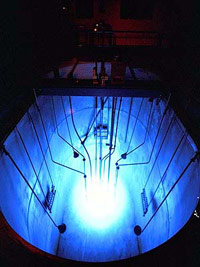
IRIS login | Reed College home Volume 96, No. 2: June 2017
Reedies explain threat from Japan's radiation release
The alarming news coming out of Japan about potential nuclear reactor meltdowns has sparked considerable interest in Reed's research reactor. The March 17 Oregonian did a nice job of assessing the minimal risk associated with Oregon's two research reactors (Reed and OSU) in its story, "State research reactors can't melt down."
The reactor is used for experiments such as measuring the amount of specific elements in samples. A recent experiment searched shards from an ancient ceramic pot to find impurities in the clay that could help pinpoint the location where the pot was made. Using the reactor allowed researchers to identify the elements while leaving the artifact intact.
Reactor Facility Director Stephen Frantz has been a high-demand interviewee with Pacific Northwest media outlets (OPB, KGW-TV , KING-5 Seattle) to help assess the danger posed to the region by the radiation release in Japan.
The Reed reactor is roughly the size of a washing machine and runs on low enriched uranium. Because it is a research reactor and not a power-generating reactor, it does not generate enough heat to boil water, and is only utilized when conducting tests or experiments. Even if there were a massive earthquake while the reactor was operating and all the cooling water leaked out, the air around the fuel would adequately cool the reactor. As the Oregonian headline indicated, the reactor cannot produce enough heat to cause a meltdown.
Some Reed reactor operators have been educating readers of various websites and on social media where misinformation travels quickly. Senior Reactor Operator Ellen McManis '12 was frustrated by the lack of context in which levels of radiation were being bandied around. She asked her cartoonist friend Randall Munroe to create a visual representation that could help provide a frame of reference. Munroe graphed the exposure levels of such things as eating bananas or flying cross-country. Their efforts were chronicled in a story by Boston's NPR station WBUR.
Currently 46 Reed undergraduate are licensed as reactor operators with the Nuclear Regulatory Commission. Students take the licensing exam after a full academic year of training. NRC examiners administer the three-hour written exam and four-hour walkthrough-operational-oral exam.
Tags: alumni, Japan, radiation, Reed reactor



LATEST COMMENTS
steve-jobs-1976 I knew Steve Jobs when he was on the second floor of Quincy. (Fall...
Utnapishtim - 2 weeks ago
Prof. Mason Drukman [political science 1964–70] This is gold, pure gold. God bless, Prof. Drukman.
puredog - 1 month ago
virginia-davis-1965 Such a good friend & compatriot in the day of Satyricon...
czarchasm - 4 months ago
John Peara Baba 1990 John died of a broken heart from losing his mom and then his...
kodachrome - 7 months ago
Carol Sawyer 1962 Who wrote this obit? I'm writing something about Carol Sawyer...
MsLaurie Pepper - 8 months ago
William W. Wissman MAT 1969 ...and THREE sisters. Sabra, the oldest, Mary, the middle, and...
riclf - 10 months ago